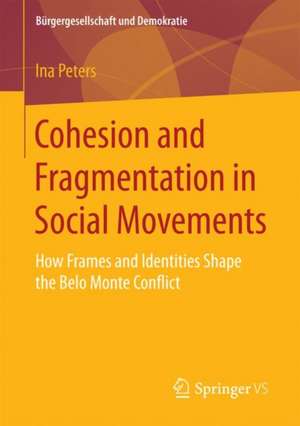Cohesion and Fragmentation in Social Movements: How Frames and Identities Shape the Belo Monte Conflict: Bürgergesellschaft und Demokratie
Autor Ina Petersen Limba Engleză Paperback – 11 sep 2017
Din seria Bürgergesellschaft und Demokratie
-
 Preț: 276.56 lei
Preț: 276.56 lei - 13%
 Preț: 407.73 lei
Preț: 407.73 lei -
 Preț: 409.49 lei
Preț: 409.49 lei - 15%
 Preț: 475.93 lei
Preț: 475.93 lei -
 Preț: 450.33 lei
Preț: 450.33 lei -
 Preț: 350.50 lei
Preț: 350.50 lei -
 Preț: 490.07 lei
Preț: 490.07 lei - 15%
 Preț: 528.48 lei
Preț: 528.48 lei -
 Preț: 421.34 lei
Preț: 421.34 lei -
 Preț: 404.69 lei
Preț: 404.69 lei - 15%
 Preț: 470.06 lei
Preț: 470.06 lei -
 Preț: 380.84 lei
Preț: 380.84 lei -
 Preț: 315.95 lei
Preț: 315.95 lei -
 Preț: 187.12 lei
Preț: 187.12 lei - 15%
 Preț: 449.19 lei
Preț: 449.19 lei -
 Preț: 245.67 lei
Preț: 245.67 lei -
 Preț: 419.21 lei
Preț: 419.21 lei -
 Preț: 489.87 lei
Preț: 489.87 lei -
 Preț: 318.44 lei
Preț: 318.44 lei -
 Preț: 351.49 lei
Preț: 351.49 lei - 15%
 Preț: 641.20 lei
Preț: 641.20 lei - 15%
 Preț: 537.46 lei
Preț: 537.46 lei -
 Preț: 458.39 lei
Preț: 458.39 lei -
 Preț: 458.01 lei
Preț: 458.01 lei -
 Preț: 275.19 lei
Preț: 275.19 lei -
 Preț: 350.89 lei
Preț: 350.89 lei -
 Preț: 416.71 lei
Preț: 416.71 lei -
 Preț: 315.02 lei
Preț: 315.02 lei -
 Preț: 416.54 lei
Preț: 416.54 lei -
 Preț: 418.07 lei
Preț: 418.07 lei -
 Preț: 323.28 lei
Preț: 323.28 lei -
 Preț: 418.45 lei
Preț: 418.45 lei -
 Preț: 416.92 lei
Preț: 416.92 lei -
 Preț: 422.90 lei
Preț: 422.90 lei - 15%
 Preț: 446.92 lei
Preț: 446.92 lei -
 Preț: 418.67 lei
Preț: 418.67 lei -
 Preț: 421.55 lei
Preț: 421.55 lei -
 Preț: 277.32 lei
Preț: 277.32 lei -
 Preț: 320.79 lei
Preț: 320.79 lei -
 Preț: 486.72 lei
Preț: 486.72 lei -
 Preț: 421.72 lei
Preț: 421.72 lei -
 Preț: 429.06 lei
Preț: 429.06 lei -
 Preț: 356.11 lei
Preț: 356.11 lei -
 Preț: 214.19 lei
Preț: 214.19 lei -
 Preț: 354.93 lei
Preț: 354.93 lei - 15%
 Preț: 466.45 lei
Preț: 466.45 lei -
 Preț: 420.58 lei
Preț: 420.58 lei - 15%
 Preț: 548.93 lei
Preț: 548.93 lei -
 Preț: 456.10 lei
Preț: 456.10 lei
Preț: 485.07 lei
Nou
Puncte Express: 728
Preț estimativ în valută:
92.82€ • 97.17$ • 76.80£
92.82€ • 97.17$ • 76.80£
Carte tipărită la comandă
Livrare economică 05-19 aprilie
Preluare comenzi: 021 569.72.76
Specificații
ISBN-13: 9783658193256
ISBN-10: 3658193255
Pagini: 277
Ilustrații: XVI, 277 p. 4 illus.
Dimensiuni: 148 x 210 mm
Greutate: 0.35 kg
Ediția:1st ed. 2018
Editura: Springer Fachmedien Wiesbaden
Colecția Springer VS
Seria Bürgergesellschaft und Demokratie
Locul publicării:Wiesbaden, Germany
ISBN-10: 3658193255
Pagini: 277
Ilustrații: XVI, 277 p. 4 illus.
Dimensiuni: 148 x 210 mm
Greutate: 0.35 kg
Ediția:1st ed. 2018
Editura: Springer Fachmedien Wiesbaden
Colecția Springer VS
Seria Bürgergesellschaft und Demokratie
Locul publicării:Wiesbaden, Germany
Cuprins
Social Movement Theory.- Grounded Theory Methodology.- Economic and environmental policy in the Brazilian Amazon.- Rationale of the Belo Monte conflict.- Traveling of theories and concepts.
Notă biografică
Ina Peters is head of research management at the Academy for Spatial Research and Planning (ARL). She was a research fellow at the GIGA Institute of Latin American Studies headed by Professor Detlef Nolte and a doctoral student of Professor Kai-Uwe Schnapp at Universität Hamburg.
Textul de pe ultima copertă
Ina Peters analyzes how collective identities and collective action frames have contributed to the persistence and eventual fragmentation of the collective action against the Belo Monte Dam. Reconstructing the rationale of the conflict, Ina Peters addresses theoretical research gaps regarding the dynamics – particularly cohesion and fragmentation – in social movements. The study considers the influence of the regional context and the applicability of Western theories in non-Western case studies. It is based on primary data that was collected through semistructured interviews and analyzed in detail by means of a combined top-down and bottom-up procedure based on the grounded theory methodology.
Contents
- Social Movement Theory
- Grounded Theory Methodology
- Economic and environmental policy in the Brazilian Amazon
- Rationale of the Belo Monte conflict
- Traveling of theories and concepts
Target Groups
- Researchers and students of Social Movement Research, Latin American Studies, and (Comparative) Area Studies
- Practitioners in the fields of environmental governance, sustainable development, and human rights
The Author
Ina Peters is head of research management at the Academy for Spatial Research and Planning (ARL). She was a research fellow at the GIGA Institute of Latin American Studies headed by Professor Detlef Nolte and a doctoral student of Professor Kai-Uwe Schnapp at Universität Hamburg.
Caracteristici
Social Movements in the Amazon Includes supplementary material: sn.pub/extras
